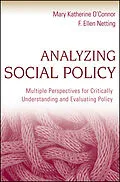From formulation to implementation, an approach to the analysis
of social policy through the lens of research
Analyzing Social Policy prepares professionals and
students to make better informed decisions related to identifying
and understanding the intricacies and potential impact of social
policymaking and enactment on their organization as well as their
individual responsibilities, goals, and objectives.
Authors Mary Katherine O'Connor and F. Ellen Netting thoroughly
examine various approaches to the analysis of social policies and
how these approaches provide the knowledge, multiple perspectives,
and other resources to understand and grasp the nuances of social
policy in all its complexity.
Comprehensive and based on research, Analyzing Social Policy
explores:
* An overview of the practice of social policy analysis
* The role of research in guiding policy analysis
* The idea of policy analyses as research
* Themes, assumptions, and major theories that undergird rational
models of policy analysis
* Nonrational themes, assumptions, and major theories informing
nontraditional interpretive and critical approaches to policy
analysis
* Strategies for applying selected models and approaches when
engaging in policy analysis as research
Providing practitioners and students with a set of tools that
can be used to enhance an understanding of what constitutes policy
as well as acceptable standards for critical analysis of policy,
this resource enables policy advocates--regardless of their
level--to be political, strategic, and critical in their
work.
Autorentext
Mary Katherine O'Connor, MSW, PhD, is a Professor in the
School of Social Work at Virginia Commonwealth University where she
has taught in the MSW and PhD programs for over twenty years. She
has authored or coauthored numerous books, chapters, and journal
articles in the areas of public child welfare practice, services to
street children, and qualitative research method development.
F. Ellen Netting, MSSW, PhD, is a Professor of Social
Work and Samuel S. Wurtzel Chair at Virginia Commonwealth
University where she teaches in the BSW, MSW, and PhD programs. She
has authored or coauthored numerous books, chapters, and journal
articles in the areas of health and human service delivery issues
for frail elders, as well as nonprofit management concerns.
Zusammenfassung
From formulation to implementation, an approach to the analysis of social policy through the lens of research
Analyzing Social Policy prepares professionals and students to make better informed decisions related to identifying and understanding the intricacies and potential impact of social policymaking and enactment on their organization as well as their individual responsibilities, goals, and objectives.
Authors Mary Katherine O'Connor and F. Ellen Netting thoroughly examine various approaches to the analysis of social policies and how these approaches provide the knowledge, multiple perspectives, and other resources to understand and grasp the nuances of social policy in all its complexity.
Comprehensive and based on research, Analyzing Social Policy explores:
-
An overview of the practice of social policy analysis
-
The role of research in guiding policy analysis
-
The idea of policy analyses as research
-
Themes, assumptions, and major theories that undergird rational models of policy analysis
-
Nonrational themes, assumptions, and major theories informing nontraditional interpretive and critical approaches to policy analysis
-
Strategies for applying selected models and approaches when engaging in policy analysis as research
Providing practitioners and students with a set of tools that can be used to enhance an understanding of what constitutes policy as well as acceptable standards for critical analysis of policy, this resource enables policy advocatesregardless of their levelto be political, strategic, and critical in their work.
Inhalt
Foreword xi
Preface xv
Acknowledgments xxiii
1 An Overview of Social Policy Analysis 1
Necessary Groundwork 2
Identifying Definitions and Forms of Policy 10
Recognizing Levels and Scope of Social Policies 19
Conceptualizing Policy Analysis 28
Conclusion 34
Discussion Questions 35
2 Thinking of Policy Analysis as Research 36
The Role of Research in Guiding Policy Analysis 37
What Constitutes Research? 41
Focusing the Policy Analysis 46
An Expansive View of Policy Analysis Research 53
Conclusion 60
Discussion Questions 61
Case Study 63
Service, Engagement, and Volunteerism: What's the Policy All About? 63
3 Rational Policy Analysis 75
Reason and Rationality 76
Rational Assumptions of the Positivist/Postpositivist Paradigm 78
Rational Models of Policy Analysis 79
How to Assess the Degree to Which an Analysis Approach is Rational 99
Conclusion 102
Discussion Questions 103
4 Applications of Rational Policy Analysis 104
Using the Chambers and Wedel Policy/Program Analytical Framework 106
Using Jansson's Six-Step Policy Analysis Framework 111
Using Huttman's Policy Analysis Model 115
Using Holcomb and Nightingale's Implementation Analysis Model 123
Using Segal and Bruzuzy's Questions for Social Welfare Policy Analysis 128
Discussion 134
Concluding Remarks About Rational Policy Analysis 135
Discussion Questions 136
5 Nonrational Policy Analysis 137
Reason and Nonrationality 137
Nonrational Assumptions of the Interpretivist/Constructivist Paradigm 139
Nonrational Approaches to Policy Analysis 142
How to Assess the Degree to Which an Analysis Approach is Nonrational 165
Conclusion 168
Discussion Questions 169
6 Applications in Nonrational Policy Analysis 170
Using Stone's Policy Paradox Approach 172
Using Kingdon's Policy Primeval Soup or Garbage Can Approach 182
Using Prigmore and Atherton's Policy Analysis Approach 188
Using Guba's Policy-in-Action Approach 193
Using an Impact-Analysis Approach 197
Discussion 202
Conclusion 204
Discussion Questions 204
7 Critical Policy Analysis 206
Reason in Radicality 207
Assumptions of the Critical Paradigm 208
Critical Approaches to Policy Analysis 210
How to Assess the Degree to Which an Analysis Approach is Critical 232
Conclusion 236
Discussion Questions 237
8 Applications in Critical Policy Analysis 238
Using Marx's Historical or Dialectical Method 241
Analyzing Cultural Responsiveness in Policy
Formulation at the Organizational Level 248
Using Lejano's Normative Policy Analysis 254
Using Moser's Approach to Gender Policy Implementation 260
Using Schiele's Afrocentric Framework of Policy Analysis 265
Discussion 271
Conclusion 273
Discussion Questions 273
Epilogue 275
References 285
About the Authors 293
Author Index 295
Subject Index 299
